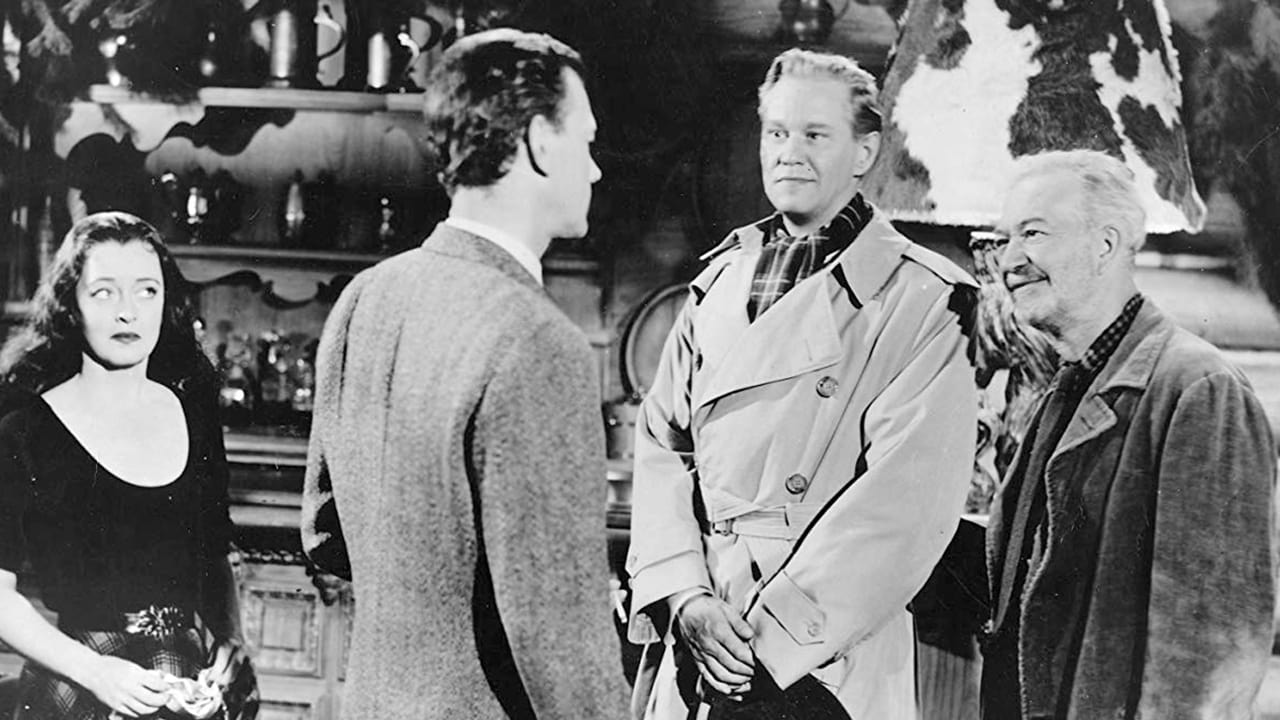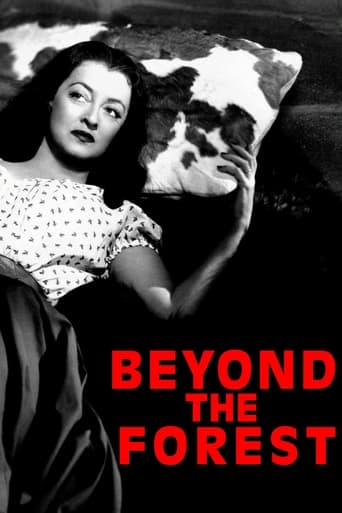

the leading man is my tpye
... View MorePretty good movie overall. First half was nothing special but it got better as it went along.
... View MoreIt's the kind of movie you'll want to see a second time with someone who hasn't seen it yet, to remember what it was like to watch it for the first time.
... View MoreGreat example of an old-fashioned, pure-at-heart escapist event movie that doesn't pretend to be anything that it's not and has boat loads of fun being its own ludicrous self.
... View MoreIs BEYOND THE FOREST an overripe and over-the-top potboiler or a potent, underrated film noir? Both, actually, with an emphasis on the latter. This is film noir's MADAME BOVARY wherein a provincial housewife's romantic fantasies and big city dreams bring tragedy to everyone in her orbit and it's the "twisted sister" of Vincente Minnelli's ode to Flaubert's driven, deluded anti-heroine, released the same year. Nineteen forty-nine was the year of the desperate housewife in Hollywood- in addition to Bette Davis & Jennifer Jones, there's also Audrey Totter in TENSION and Lizabeth Scott in TOO LATE FOR TEARS, postwar noir women who "expect and demand a better life and plan to achieve it by any means necessary". Forty year-old Bette Davis "with her low-cut peasant blouses, long black wig, and carmine lips" is unquestionably miscast but, like the film itself, that actually works in a perverted sort of way. If Virginia Mayo had been cast (Davis actually lobbied for her), it would have begged the question, "why doesn't this beautiful girl just hop a bus to New York or Hollywood or something?" but with a not-so-young-anymore Rosa -out of options and rapidly running out of time- there's a palpable sense of entrapment as the irrational resentments that have simmered for far too long are ready to erupt. Still, the movie also has its amusing aspects and you can't help but smile as Rosa sashays down the street and all the men stop and stare. How could a past-her-prime, dimestore siren like that keep Joseph Cotten and David Brian in such thrall? Why, sex of course. Rosa no doubt did things in bed they couldn't get enough of, much like the hold Wallis Simpson had over the Duke of Windsor. The crime of Rosa Moline was similar to that of Phyllis Hochen in THE UNHOLY WIFE (desperate for a way out, she ends up shooting her husband's best friend) and from the overblown opening prologue scroll to the mounting hysteria and rampant symbols of Hell that culminate in a "shocking conclusion", Vidor's "Bovary" casts a spell as well. Written off as a "camp classic" for years, BEYOND THE FOREST has been reassessed of late:Bette Davis tires of life married to a small-town doctor, so she takes off to Chicago for an affair, hopping the most monstrously phallic train in film history. Her frenzied performance is met on the other side of the camera by director King Vidor, who matches her excesses shot for shot. The "What a dump!" line quoted in WHO'S AFRAID OF VIRGINIA WOOLF? originates here, though it's actually one of the film's more naturalistic moments. Much of Vidor's late work flirts dangerously with camp; this 1949 effort, I'm afraid, frequently succumbs, though it has a weird kind of power and integrity. With Joseph Cotten and David Brian. -Dave Kehr BEYOND THE FOREST, with its main character's dissatisfaction with small- town middle-class morality, its big-city expressionistic mise-en-scène, and Davis, with the most extreme portrayal of a malignant bitch of the forties, we have a work that is firmly rooted in the tradition of film noir...this paean to amour fou is one of the most operatic of all films noirs -at once both moralistic and obdurate, grandly emotive, overbearing, and magnificent. -The American Film Noir A TV perennial back in the day, legal hassles prevent King VIdor's unsung noir from being shown today. As of this writing, it's not in the Warner Archives and TCM hasn't aired it in well over a decade. That's a shame.
... View MoreOnly Bette Davis (along with Joan Crawford) could take a trashy film and make it absolutely compelling. No, this isn't a good movie, probably not even a fair movie but oh, Bette, you make it all worthwhile.Bette wears the worst wig of her career, some really surrealistic make-up and was years too old for the part......so what?? When she delivers those famous lines "What a dump", you could jump for joy. This is Davis at her campiest and you can bet she knew it.The story line is fairly simple. A small town bitch wants to be a big city bitch and takes a lover to attain that goal. She couldn't care less that she has a husband, played by Joseph Cotton, when she sets her sights for the boyfriend played by that perpetually bland actor David Brian. All hell breaks loose as Davis chews up the scenery and her fellow actors. The final scene as Davis drags herself to the train station is the raison d'etre for the cult following that has developed around this film. It is a film lovers delight. She was some dame!!!
... View MoreMany have blasted this film as pure camp, some without having even seen it, I'm sure. While this is no masterpiece, it really isn't that bad--it plays for the most part like a standard noirish "woman's film" from the forties. Since this sort of thing was Davis' specialty, she isn't particularly out of place here. Some of the dialog is dated and over the top, but not nearly so much as this film's detractors would have one believe. What truly stays in the mind is Bette's awful appearance--she's obviously too old to play the part of the small town sexpot, Rosa Moline. Beyond that, she's made to wear some awful black fright wig that makes her prematurely saggy face look positively witch like! As a romantic interest, she stretches our sense of credibility (however, I will allow for the fact that black Maria Montez type hair was probably thought sexy in those days-and she does grasp a sense of how a faded small town belle might try to put herself across, as she swaggers around with false bravado in her tight dresses and sexy ---- me shoes. All in all, not as bad as they say--the whole project probably shocked Davis herself (as well as quite a few critics who generally not kind to it) into realizing that her leading lady days were numbered. A strange career move in the lengthly career of a great, if misunderstood star.
... View MoreBeyond The Forest drags around a reputation as one of the all-time stinkers, a reputation that's far from deserved but not hard to understand. This is the movie whose name Martha, in Edward Albee's play Who's Afraid of Virginia Woolf, can't remember after she quotes the emblematic line `What a dump.' (Thrown away by Bette Davis, the line got parodied as high camp by Elizabeth Taylor in the play's screen version.) It also fell at a time when Davis' best work was thought to be well behind her, and when she was labeled `difficult,' a year before All About Eve gave her career a booster shot.And, to be fair, there are aspects of the movie itself, a lurid and overwrought drama, that account for some of the scorn that's been heaped upon it. Married to impoverished physician Joseph Cotton in a grim Wisconsin factory town, Davis (as Rosa Moline) chafes against the boredom of her life and craves romance, adventure, big-city life as exemplified by Chicago, just a short train-ride away. That's where big-shot David Brian lives the high life but now and then visits a hunting lodge in the woods where he caught Davis' eye. She's just another notch on his bedpost but she's convinced herself he'll hand her the life of her fantasies. The plot cooks up a witch's brew of adultery, abortion and murder. But director King Vidor does well with the overripe material, which smacks of midcentury `regional' literature. Though Davis' long black wig is a sight for sore eyes, it's entirely in character for the slutty Rosa with longings above her breeding. When she finally travels to the Big Town, Vidor turns it into a tense yet poignant cinematic vignette.Admittedly, there are weaknesses: the big murder trial seems irrelevant even in this far-fetched plot, and both Cotton and Brian get elbowed offscreen by the volcanic Davis. But Beyond the Forest's operatic ending more than compensates for the movie's faults. Greasy-faced and straggle-haired, guzzling pitchers of water and sweating like a stuck pig, Davis, dying and delirious from peritonitis (that botched operation), rouses herself for one last trip to Chicago. Kicking away her native American maid, she slaps on her makeup and finery and staggers down to the railroad tracks where the approaching train whistles its siren song of `Chicago, Chicago.' Alas, poor Rosa Moline dies like a dog, face down in the mud, as it passes her by. It's an eye-popping, go-for-broke performance, and maybe only Davis at this desperate juncture in her stardom could have brought off this Liebestod.
... View More